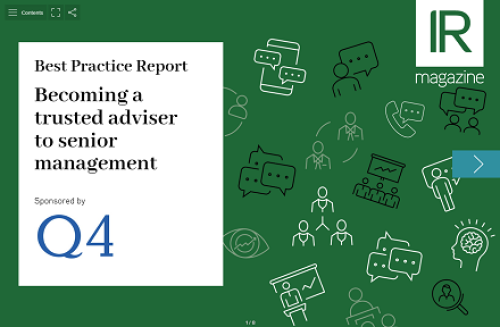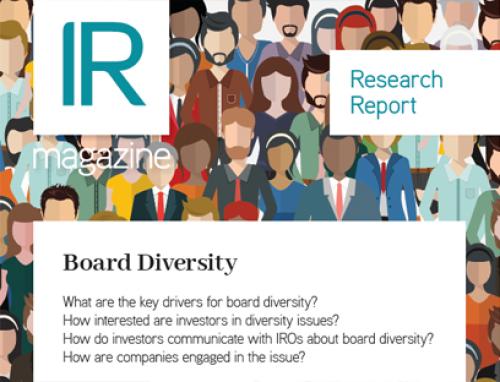Global head of advisory services discusses her new role and IR industry trends
Can you describe your new role?
My title is global head of advisory services and I’m responsible for NASDAQ’s advisory services business, which includes our shareholder analysis, surveillance, investor targeting, perception studies and tax/regulatory services.
Previously I managed our advisory services business for EMEA and Asia-Pacific. Recently we restructured the team to create a global head with the intent of creating greater alignment between our various regional teams and to ensure clients are able to take full advantage of our global presence and scale.

Deirdre Dastous, NASDAQ OMX
‘The competition for actively managed capital has become more intense’
Which previous roles have you had in the IR industry?
I have been in the industry for 13 years in a variety of roles supporting investor relations clients. I joined CCBN in San Francisco in 2001, managing a team that provided webcasting for results announcements. In 2003 I moved to London and took over management of our European IR webcasting and IR website practice.
Shortly thereafter, we were acquired by Thomson Financial and I had the opportunity to move to the data and workflow solution side of our business, running a team that supported our Thomson ONE IR (T1IR) desktop product, as well as business intelligence offerings that were a part of our portfolio at that time.
When we merged with Reuters, I played a role in the business integration and subsequently took on an operational role across our EMEA and Asia-Pacific businesses. For three years I was the EMEA commercial head of our investor relations business and then moved into our advisory services practice in 2012.
What have been the biggest challenges in terms of integrating the service offerings from Thomson Reuters and NASDAQ OMX?
I feel really fortunate that we were bringing together two exceptional teams and two very strong product offerings. The only challenge is ensuring all of our clients are receiving the right product and service to best help support their IR team’s objectives. We are deeply engaged in this review process and I am excited that our clients are able to benefit from the combined knowledge and experience of these teams.
What are your main objectives for the next 12 months?
My primary objective is to deliver products and services that add significant value for our clients, supporting their strategic objectives and helping them be more effective IR professionals. We will be engaging more regularly and deeply with our clients to ensure we are meeting their needs. We are also very excited to be conducting more proprietary research and delivering thought leadership on key topics in the market that we believe will affect our clients.
The next 12 months will see exciting technology developments and innovation that will deliver new data and content to our clients – this is a key priority for me. Finally, we are focused on becoming more efficient as an organization: investments in our internal systems and technology will help our analysts have more time to engage with the clients and add value.
What issues are IR teams particularly focused on at the moment?
We have seen an increasing level of interest in our investor targeting solutions as more and more IR teams are really focused on ensuring they are deriving maximum output from their senior management’s engagement with the investment community. The competition for actively managed capital has become more intense so it is increasingly important for companies to have a strong plan and strategy to attract and retain the right investors.
Shareholder activism remains a focus for many companies in the US and we are certainly seeing signs it may increase in Europe over the next 12 months. One of the hot topics on the agenda of some activists is the issue of returning cash to shareholders. Many companies we work with are starting to think more actively about this and we have recently been engaged in several projects to help clients look at the anticipated impact of dividend policy changes.
What impact do you think the corporate access rule changes in the UK will have on IR teams?
This is something we have been monitoring very closely – clearly is it still relatively early days but one of the likely outcomes is that, at least for mid and small-cap companies, there will be less support available from the sell side, both from a research and a pure corporate access perspective. Mid-cap and small-cap companies will have to be more proactive and work harder to ensure they are getting and maintaining the right level of visibility with existing and potential investors.
And it’s worth noting that there are related conversations taking place more broadly within the EU as part of the MiFID revisions – it’s reasonable to think this may not be just a UK issue.










